Last Updated on February 1, 2026
The best home EV chargers can make your life much easier when switching to an electric or plug-in hybrid car. They’re safer, faster, and more convenient, and you can use them to take advantage of cheaper overnight energy tariffs and renewable electricity from solar panels.
The electric vehicle (EV) boom is really taking off in the UK. According to the latest official figures, there were over 1.7 million zero-emission vehicles (mostly electric cars) licensed on UK roads as of September 2025. That’s a big jump of 36% compared to the year before, and they now make up 4.2% of all vehicles on the road.
While public charging points continue to expand, the most significant savings, convenience, and sustainability gains come from installing a dedicated home EV charger. Home charging is faster, safer, and cheaper, and it helps reduce pollution. You can charge when electricity costs less at night with off-peak smart tariffs like Intelligent Octopus Go, or use free solar power if you have solar panels.
Reviewing the most popular home EV chargers available in the UK can help you determine the best model for your needs.
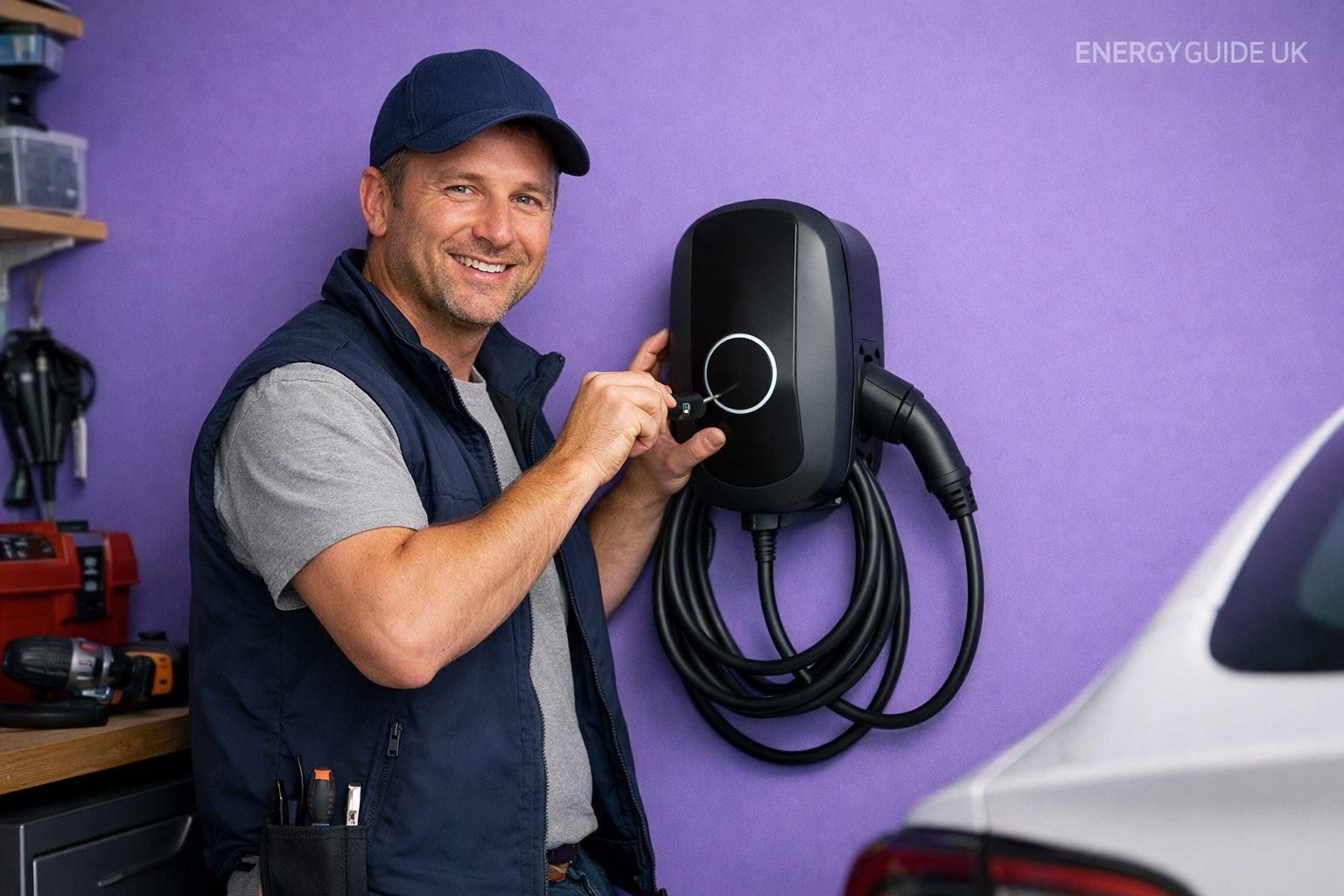
Home EV Chargers at a Glance: Top Picks for 2026:
1. Easee One – Best All-Rounder
2. Myenergi Zappi – Best Home EV Charger for Solar Panels
3. Ohme Home Pro – Best Home EV Charger for Saving Money on Bills
4. Zaptec Go 2 – Best Future-Proof Home EV Charger
5. Andersen A3 – Best Looking Home EV Charger
6. Wallbox Pulsar Max – Best Small/Compact Home EV Charger
7. EO Mini Pro 3 – Best Value Home EV Charger
8. Tesla Wall Connector – Best Home EV Charger for Tesla Owners
9. Pod Point Solo 3S – Best Network-Integrated Home EV Charger
10. Indra Smart Pro – Best UK-Made Smart Charger
Find Your Perfect Charger in 60 Seconds
Criteria for Choosing the Best Home EV Chargers
Factors considered when selecting the best EV chargers include:
- Charging speed: Most of these add about 25-30 miles of driving range per hour, which is perfect for overnight charging, so your car is ready in the morning.
- Simple controls: Phone apps to set charge times, check how much energy you’re using, and work with cheap night rates from companies like Octopus or OVO.
- Solar fit: We prioritised options that can use free power from your solar panels, if you have them, to cut the cost of charging your EV further.
- Easy setup: These are designed for typical UK homes, with safety features such as weatherproofing to withstand rain and options for built-in cables or sockets.
- Good value: Price options range from £475 to £1,100, including fitting where mentioned, so you get quality without overpaying.
Best Home EV Chargers Reviews
Easee One – Best All-Rounder
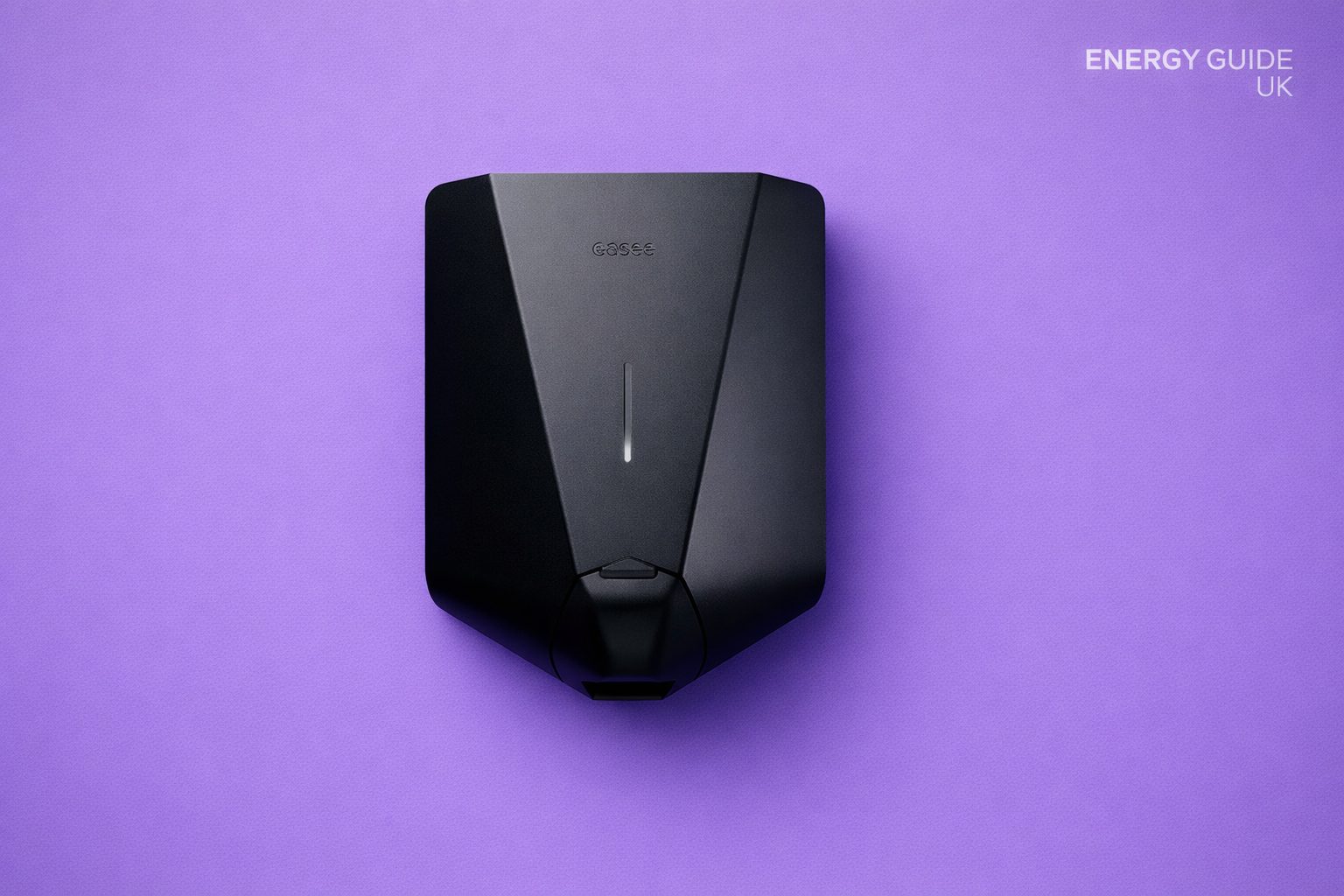
- Power: 7.4 kW (adds about 25–30 miles of range per hour)
- Connection: Tethered (cable built in) or untethered (use your car’s cable)
- Smart bits: Phone app to set charge times, check energy use, and link to cheap night tariffs like Octopus or OVO
- Solar: Yes – works with an optional add-on to use spare solar power
- Price: Around £900 to £1,100
Easee One is a small, neat charger that’s great for almost any UK home. You can choose the version with a fixed cable (so it’s always ready) or the socket type (so you use your car’s cable and keep things tidy). The app is easy to use, and you can set it once to charge overnight when electricity is cheap.
It shows you how much power you’re using and includes built-in safety features to prevent overloading your home’s electrical supply. The Easee One fits nicely in garages, driveways, or even on walls and comes in different colours to blend in. It’s ideal for families, commuters, or anyone who wants a simple, do-it-all charger that won’t cause hassle. Many installers like it because it’s quick to fit and works in most houses.
Myenergi Zappi – Best Home EV Charger for Solar Panels
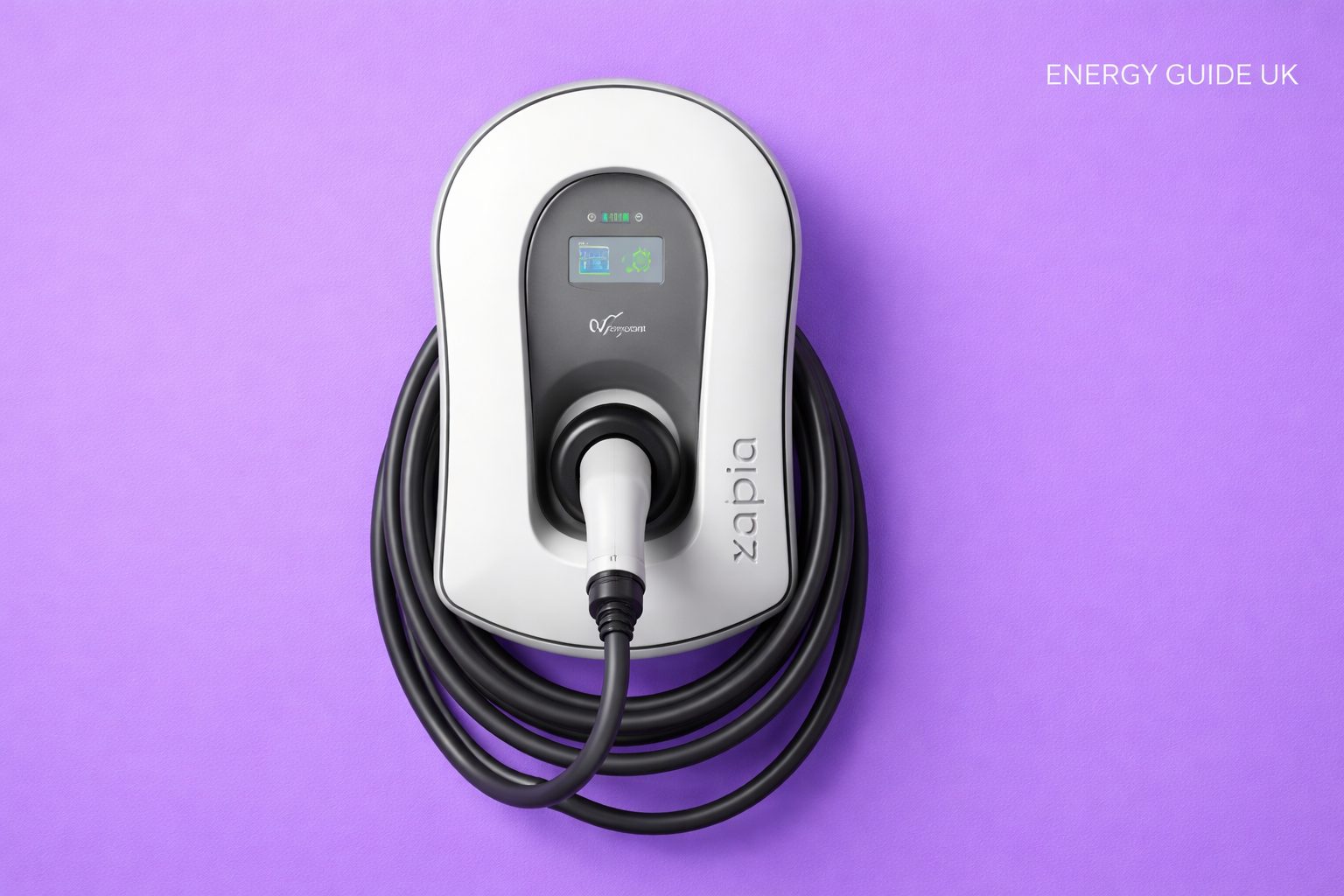
- Power: 7.4 kW (up to 22 kW if your home has three-phase electricity)
- Connection: Tethered or untethered
- Smart bits: Special Eco modes that use your spare solar power first, a clear energy dashboard in the app
- Solar: Excellent. It automatically sends extra solar electricity to your car instead of wasting it
- Price: From £779
If you have solar panels on your roof, Zappi is one of the best choices because it’s built to make the most of them. When you have efficient solar panels that produce more electricity than your house needs, Zappi sends that free power straight to your car instead of sending it back to the grid for pennies. You can see exactly where your energy is coming from and going to on the app or a small display.
It has different modes: one for pure solar, one for mixing solar with cheap night rates, and one for fast charging when you need it. Made in the UK, it’s strong and reliable outdoors. My Energy Zappi is perfect for people with solar who want to charge for free (or very cheaply) on sunny days and see real savings on their bills. Warranty is usually 3 years.
Ohme Home Pro – Best Home EV Charger for Saving Money on Bills
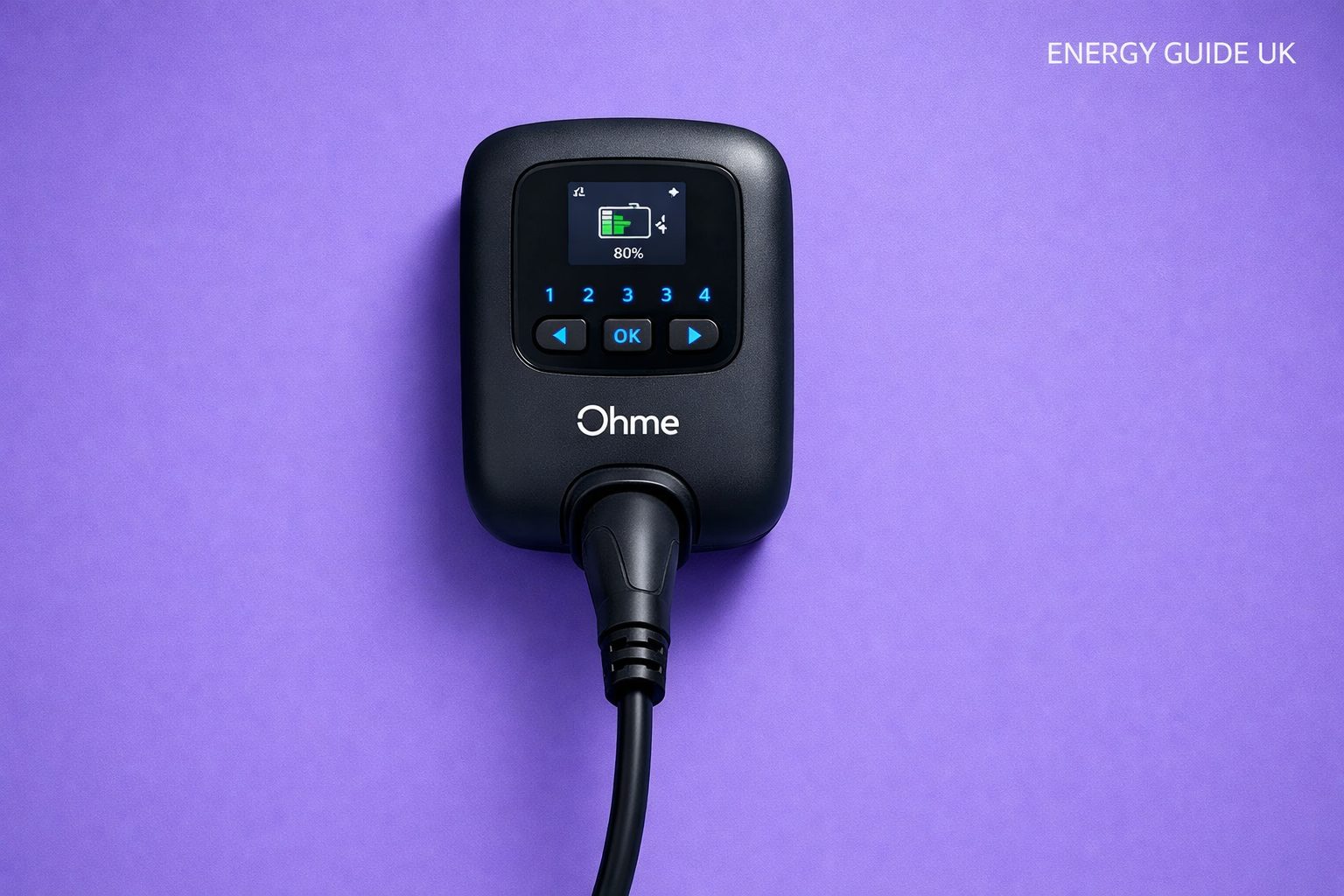
- Power: 7.4 kW
- Connection: Tethered (built-in cable)
- Smart bits: Small colour screen on the charger itself, automatic scheduling for the cheapest times, shows exact costs
- Solar: Basic support only (can work with solar, but not the primary focus)
- Price: From £999 including basic installation
Ohme Home Pro is designed for people who want the lowest possible electricity bills. It connects directly to cheap overnight tariffs (like Intelligent Octopus Go) and automatically charges your car during the lowest price hours. There’s a screen right on the charger so you can see your costs and remaining charge without opening your phone.
The app lets you set a maximum price so it never charges when electricity is expensive, and it tracks everything clearly. It’s tethered, so the cable is always ready, and it’s compact for easy fitting. The Ohme Home Pro is ideal for anyone on a variable tariff plan who wants to save money and is very user-friendly for non-techy people.
Zaptec Go 2 – Best Future-Proof Home EV Charger
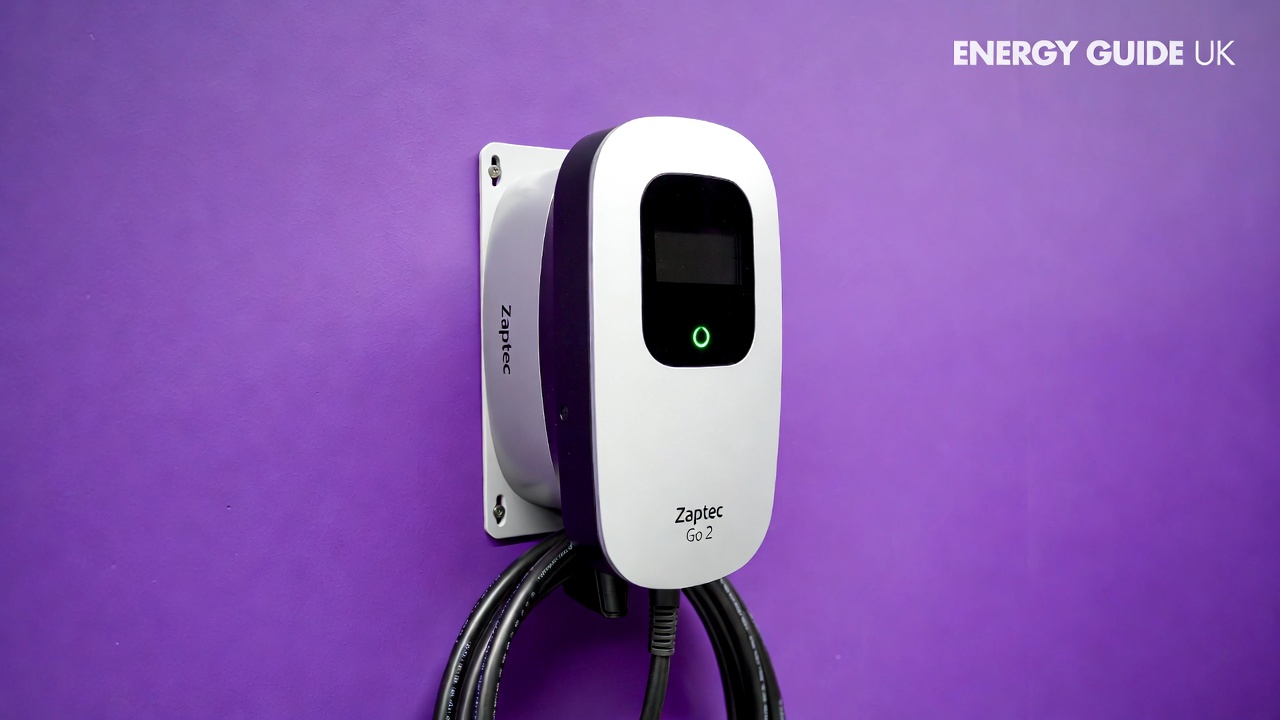
- Power: 7.4 kW (can go up to 22 kW if your home has three-phase power)
- Connection: Untethered (socket – you use your own cable)
- Intelligent bits: Gets automatic software updates over the internet, ready for two-way charging (V2G)
- Solar: Yes, it works well with solar panels
- Price: Around £600 to £700
Zaptec Go 2 is built to stay modern as electric-car technology evolves. It can get new features through online updates without anyone coming to your house. It’s already set up for “two-way” charging (when your car can send power back to your home or the grid to help during peak times or earn you money, which is coming soon in the UK).
It balances power loads, so it works smoothly with solar panels. The socket means you can use any cable length you want. It has a tough, weatherproof design for UK rain and cold. The Zaptec Go 2 is great for people who want a charger that will still be useful in 5–10 years, especially if you’re planning to add home batteries or join future energy schemes.
Andersen A3 – Best Looking Home EV Charger
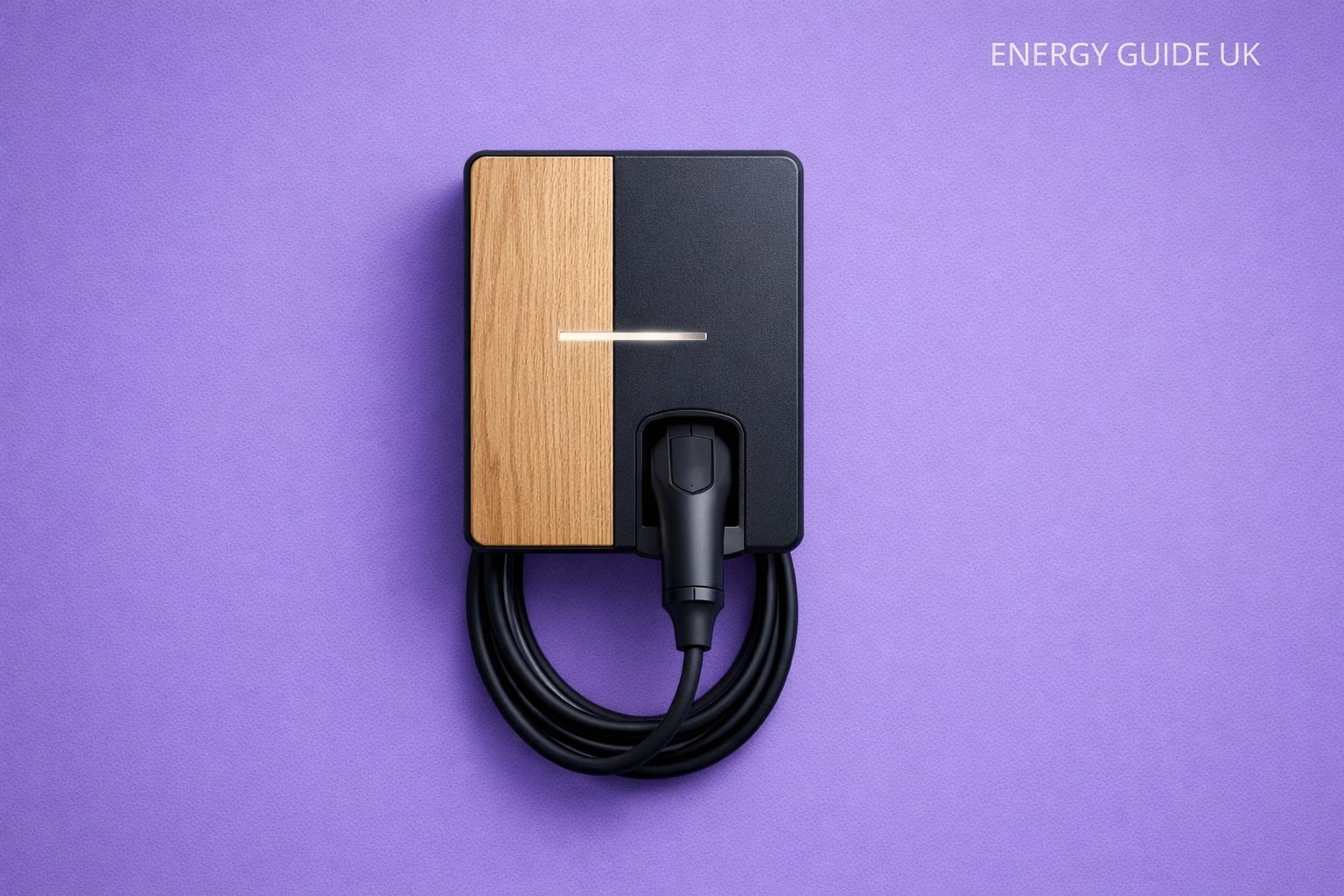
- Power: 7 kW
- Connection: Tethered
- Intelligent bits: App for scheduling, monitoring, and sharing with family
- Solar: Yes
- Price: From £995
Andersen A3 is the one you choose when you care about how it looks. Hand-made in the UK, it comes in many colours and even wood finishes, with all cables hidden away so it looks more like stylish garden furniture than a charger. The app handles basic timing and monitoring, and it works with solar panels and cheap tariffs.
The Andersen A3 is tethered, so the cable is always ready. It’s strong and built to last outdoors. Perfect for people with nice houses, listed buildings, or visible driveways who don’t want an ugly box spoiling the view. It still charges reliably while looking premium.
Wallbox Pulsar Max – Best Small/Compact Home EV Charger
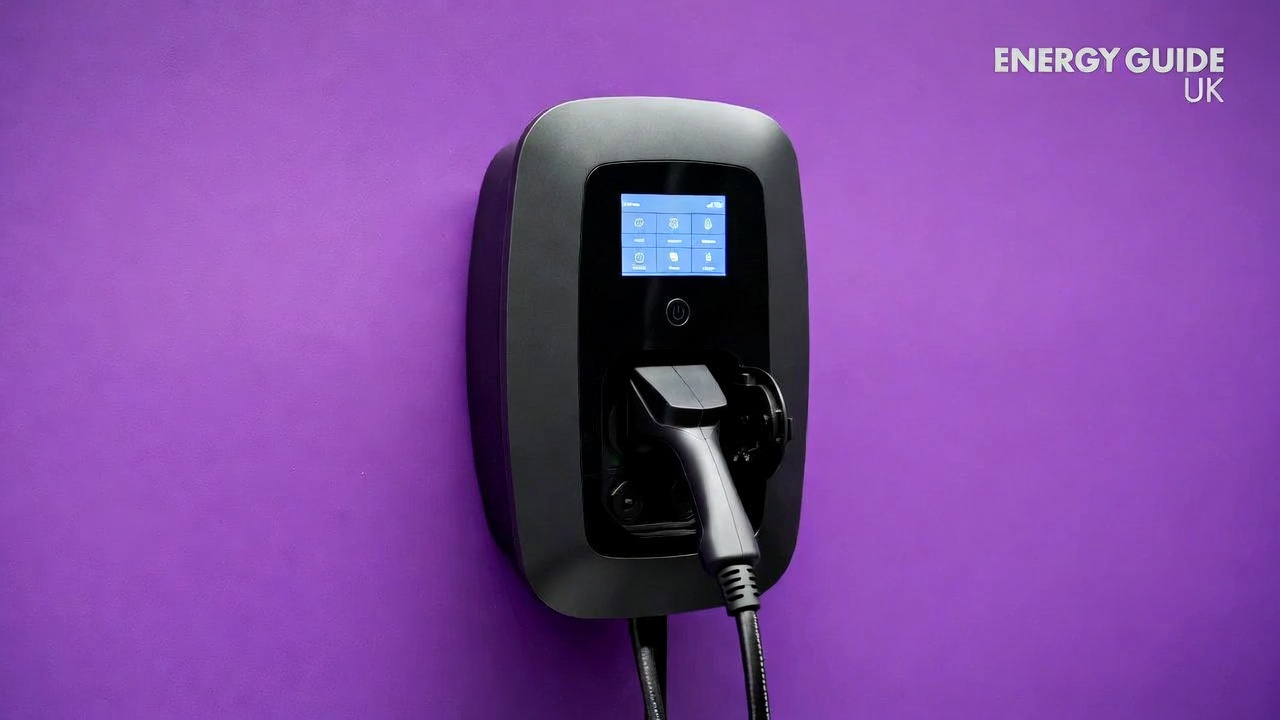
- Power: 7.4 kW
- Connection: Tethered or untethered
- Smart features: Excellent app, works with voice assistants (Alexa/Google), can share power between chargers
- Solar compatibility: Yes (through the app)
- Price: Around £500 to £600
Wallbox Pulsar Max is one of the slimmest chargers available, so it fits easily in small garages, carports, or even on narrow walls. You can choose tethered or untethered. The app is clear and straightforward, and you can even use voice commands to start or stop charging. It can share power if you ever add a second charger for another car.
Wallbox Pulsar Max works with solar panels through the app to use free energy. Weatherproof and sturdy. Ideal for people in flats, terraced houses, or anyone short on space who still wants innovative features and modern control.
EO Mini Pro 3 – Best Value Home EV Charger
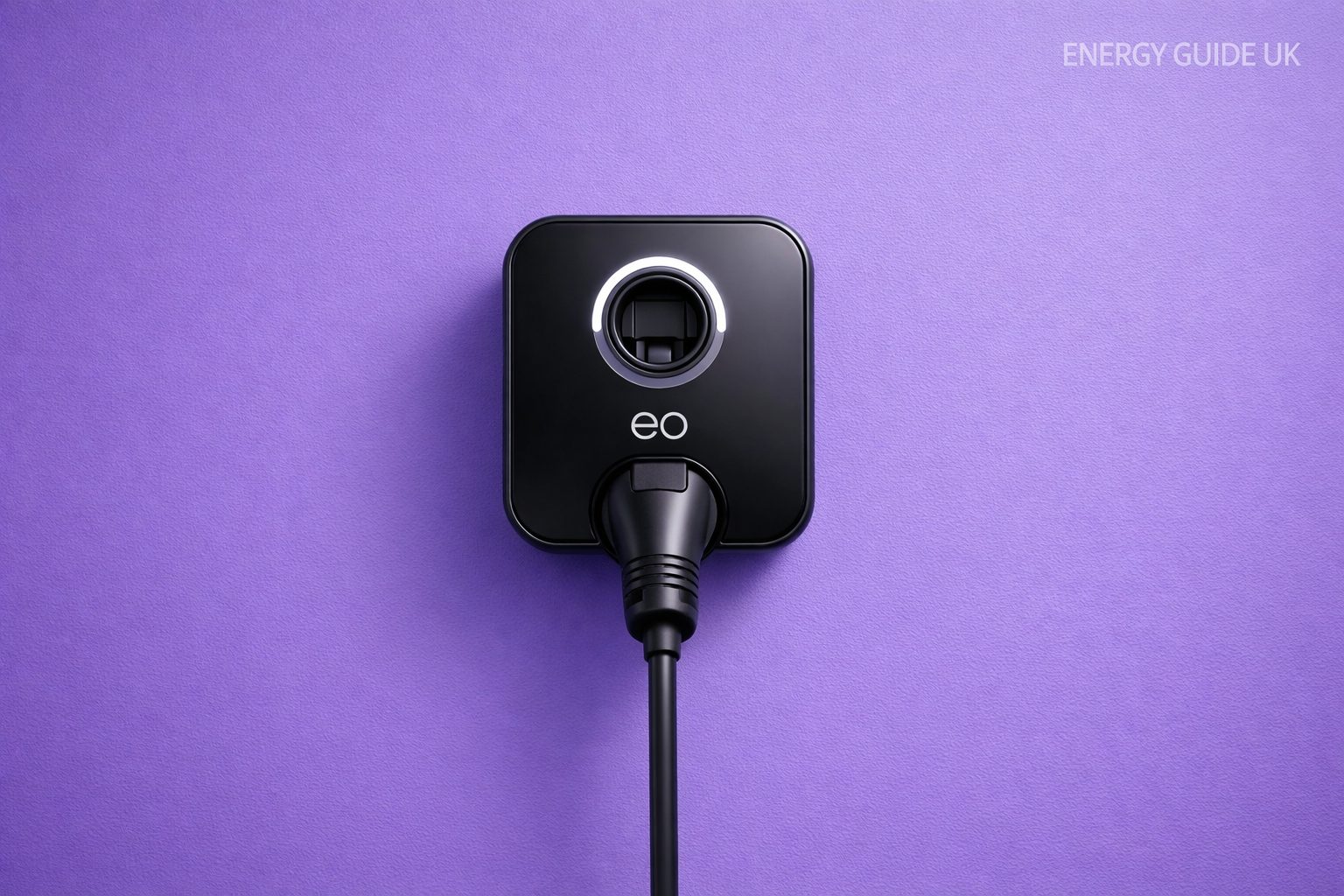
- Power: 7.4 kW
- Connection: Tethered or untethered
- Smart bits: Basic app for scheduling and monitoring, simple safety features
- Solar: Yes
- Price: Around £500 to £1,200 including fitting
The EO Mini Pro 3 offers essential smart features at a lower price. You can choose tethered or untethered, and the app lets you set charge times and see basic usage. It has built-in safety features to prevent power outages, and it works with solar panels and low-cost tariffs.
The EO Mini Pro 3 is small, easy to install, and reliable for daily use. It’s perfect for first-time EV owners, budget shoppers, or anyone who wants a no-fuss charger that still does the essentials well without extra cost.
Tesla Wall Connector – Best Home EV Charger for Tesla Owners
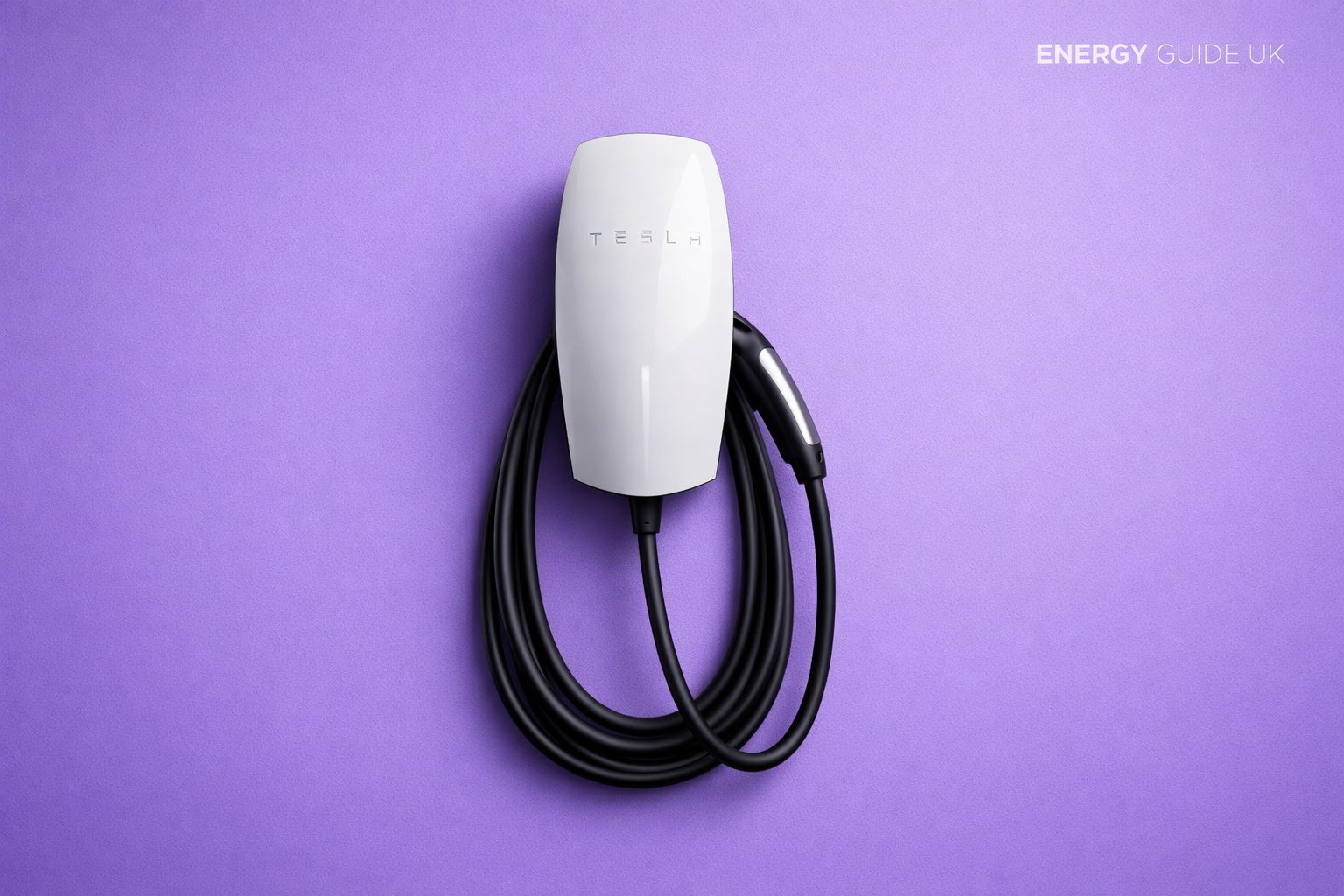
- Power: Up to 22 kW (if your home has three-phase power)
- Connection: Tethered
- Smart features: Works directly with the Tesla app, can share power between multiple chargers
- Solar compatibility: Yes, especially with the Tesla Powerwall battery
- Price: £475 for the unit
The Tesla Wall Connector is made for Tesla cars and works perfectly with the Tesla app. You can schedule, monitor, and control charging right from your car’s system. It can charge faster than most home chargers if your home has the proper power supply. You can also share power if you have more than one Tesla or charger.
It also pairs brilliantly with Tesla solar panels and Powerwall batteries for free or very cheap charging. The Tesla Wall Connector is often easier to install yourself if you’re handy, and is the best choice if you drive a Tesla and want everything to work together smoothly.
Pod Point Solo 3S – Best Network-Integrated Home EV Charger
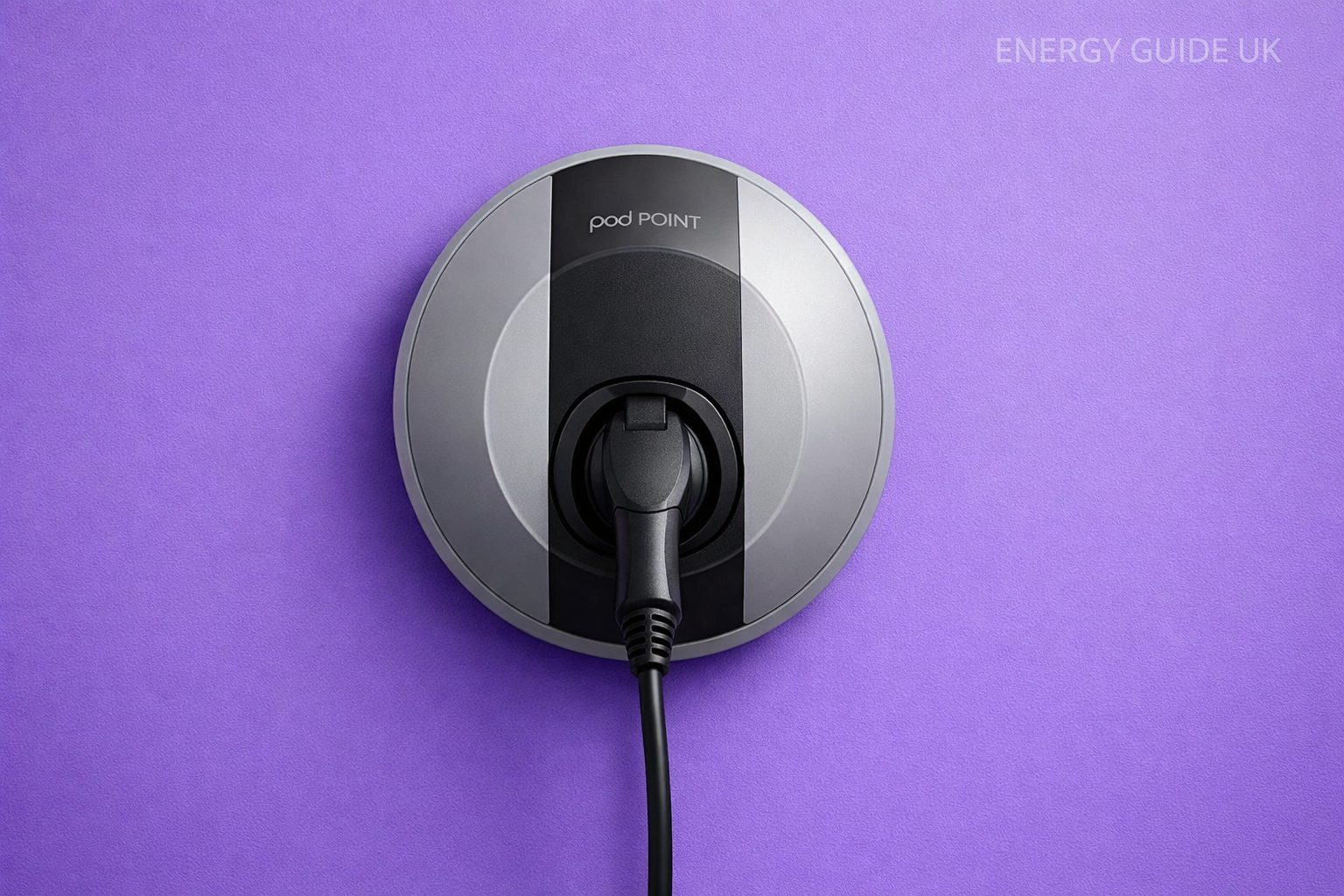
- Power: 7.4 kW
- Connection: Tethered or untethered
- Smart features: Basic app for scheduling, connects to public charging networks
- Solar compatibility: Add-on possible
- Price: From £999 including standard fitting
Pod Point Solo 3S keeps things simple. It has a basic app to set charge times, and it links to public charging networks so you can use the same account away from home. You can choose tethered or untethered, and a solar add-on is available if you want it later.
The Pod Point Solo 3S often comes with fitting included and is suitable for people who just want reliable home charging without lots of extra features, especially if you sometimes use public chargers too.
Indra Smart Pro – Best UK-Made Smart Charger
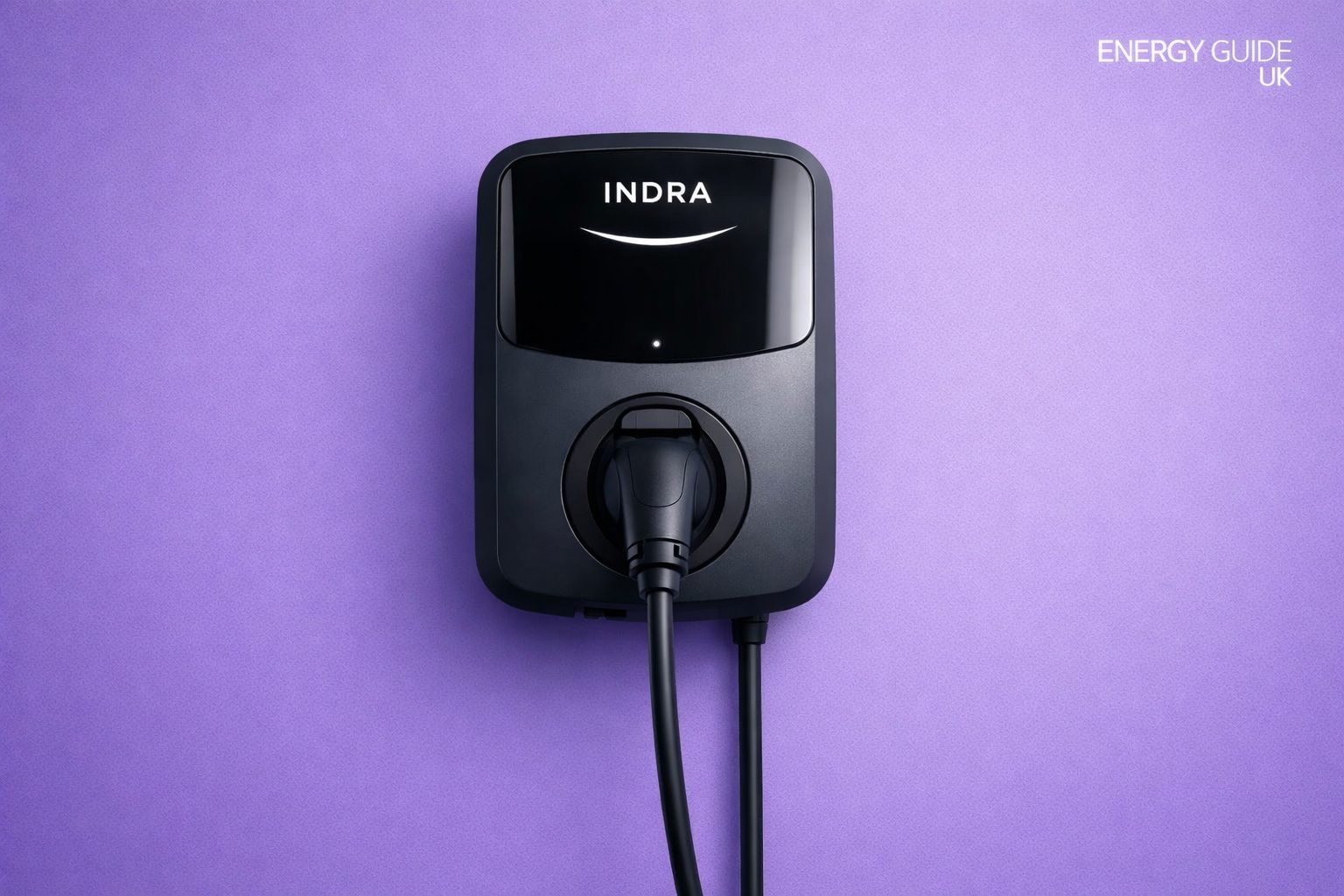
- Power: 7.4 kW
- Connection: Tethered
- Smart features: Ready for two-way charging (V2G), quick boost mode, detailed app info
- Solar compatibility: Yes
- Price: From £949 including fitting
Indra Smart Pro is made in the UK and prepared for the future of energy. It can do two-way charging and send power back to your home or the grid when available, which will become more common. It also has a boost mode for fast top-ups when you’re in a hurry, and the app gives clear info about your charging.
The Indra Smart Pro works with solar panels. It’s ideal for people interested in new energy tech and want to be ready for ways to save more or even earn from their car battery.
Best Home EV Chargers Comparison Table
All these chargers add roughly 25–30 miles of range per hour on a standard UK home setup, and they all work with normal electric cars (Type 2 plug).
| Charger | Power | Connection | Solar Fit | Smart Features | Warranty | Typical Size | Price |
| Easee One | 7.4 kW | Tethered or untethered | Yes (add-on) | App scheduling, tariff link, safety | 5 years | Compact, wall-mount | £900–£1,100 |
| Myenergi Zappi | 7.4 kW (up to 22 kW) | Tethered or untethered | Excellent (built-in) | Solar modes, energy dashboard | 3 years | Standard size, outdoor OK | From £779 + fitting |
| Ohme Home Pro | 7.4 kW | Tethered | Basic | Auto cheap-time charging, on-unit screen | 3 years | Compact | From £999 fitted |
| Zaptec Go 2 | 7.4–22 kW | Untethered (socket) | Yes | Auto updates, two-way ready | 5 years | Weatherproof, durable | £600–£700 |
| Andersen A3 | 7 kW | Tethered | Yes | App control & sharing | Up to 7 years | Premium look, hidden cables | From £995 |
| Wallbox Pulsar Max | 7.4 kW | Tethered or untethered | Yes (app) | Voice control, power sharing | 3 years | Very slim | £500–£600 |
| EO Mini Pro 3 | 7.4 kW | Tethered or untethered | Yes | Basic app scheduling | 3 years | Mini / small | £500–£1,200 fitted |
| Tesla Wall Connector | Up to 22 kW | Tethered | Yes (with Powerwall) | Tesla app, power sharing | 4 years | Wall-mount, fast | £475 (unit only) |
| Pod Point Solo 3S | 7.4 kW | Tethered or untethered | Add-on | Basic app, public network link | 3 years | Standard | From £999 fitted |
| Indra Smart Pro | 7.4 kW | Tethered | Yes | Two-way ready, quick boost | 5 years | Standard, UK-made | From £949 fitted |
Home EV Chargers Smart Charging, Tariffs, and Running Costs
Why charging time matters more than charging speed
Most home EV chargers deliver similar overnight charging speeds, which shifts the real cost difference away from power output and toward timing. Electricity prices in the UK fluctuate significantly throughout the day, and charging during peak hours can cost more than charging overnight.
Smart chargers address this by controlling when electricity flows to the car. Instead of charging immediately when plugged in, the charger waits for lower cost periods, allowing drivers to benefit from off-peak rates without constant manual input.
How smart EV tariffs reduce charging costs
Smart EV tariffs are designed to encourage overnight charging by offering much lower electricity prices during specific time windows. The two top options in 2026 are:
- Intelligent Octopus Go (Octopus Energy): Off-peak rate of 7p/kWh for 6 hours overnight (usually 11:30 pm–5:30 am), applying to your whole home during that window. Peak rates around 27–31p/kWh depending on region. No changes in January 2026. Can save about £351 a year for 7,000 miles.
- OVO Charge Anytime (OVO Energy): Subscription-based plans starting at £27.50/month for up to 700 miles (effective ~4p/mile), up to £79.50/month for 2,000 miles. Pay-as-you-go option at 14p/kWh. Includes public charging vouchers. Saves up to £460 a year for 12,000 miles.
Chargers such as the Ohme Home Pro, Easee One, and Wallbox Pulsar Max work alongside these tariffs by automatically scheduling charging when prices are lowest.
Once set up, the charger handles this process in the background. The vehicle can be plugged in at any time, and charging begins only when the tariff window opens. Over the course of a year, this automation can translate into substantial savings compared to uncontrolled charging.
Preventing expensive peak-time charging
One of the most common sources of unnecessary EV charging costs is early-evening charging. Plugging in after work often coincides with the day’s most expensive electricity rates.
Smart chargers prevent this by delaying charging until prices fall. This feature alone can dramatically reduce monthly energy bills, particularly for drivers who charge frequently or cover higher annual mileage.
Smart chargers as part of a wider home energy system
For many households, EV charging no longer sits in isolation. Smart chargers increasingly interact with broader home energy systems, including dynamic tariffs, household usage patterns, and grid signals.
Some chargers respond directly to tariff price signals, while others follow schedules set within their app. A few models combine both approaches, offering flexibility depending on how hands-on the homeowner wants to be. In all cases, the charger acts as a gatekeeper, deciding when energy is drawn rather than leaving that decision to the vehicle alone.
Do smart chargers still help without a smart tariff?
Smart features remain useful even for households on standard electricity tariffs. Scheduling charging overnight can still reduce costs slightly, while load management and reliability features improve day-to-day use.
In these cases, the primary benefits shift away from pure savings and toward convenience, control, and long-term flexibility. For many households, that balance still justifies choosing a smart charger over a basic alternative.
Types of Home EV Chargers & Speeds
Home chargers come in two basic styles:
Tethered
The cable is attached to the charger like a garden hose and is always ready to plug into your car. It’s great if you park in the same spot every day and don’t need to pull out a cable each time. They suit homes with a single EV and a fixed parking position and are particularly popular where ease of use is a priority
Untethered
Just a socket on the wall; you use the cable that came with your car. They work well for homes with multiple EVs, mixed vehicle types, or future upgrade plans. They’re common in shared driveways or properties where flexibility and visual neatness matter more than speed of access.
Home EV Charger Speeds
Most UK homes use single-phase electricity (the standard setup), so chargers run at 7.4 kW. This adds about 25–30 miles of driving range per hour, which is enough to fully charge an average car (like a Nissan Leaf with a 60 kWh battery) in 8–10 hours overnight. That’s perfect for daily drives of 50–100 miles.
If your home has three-phase power (more common in bigger or newer houses), you can get up to 22 kW, adding 70–90 miles per hour and a full charge in just 2–3 hours. Checking or upgrading to three-phase might cost £1,000 extra, but it’s worth it for high-mileage drivers.
Cold weather can slow things down by 20–30% because batteries work better when warm. Many apps let you pre-heat your car to help. The table below shows real car examples (based on average efficiency of 3–4 miles per kWh):
| Power Level | Miles Added per Hour | Full Charge Time (60 kWh Battery) | Best For | Example (Tesla Model 3, 50 kWh Battery) | Example (VW ID.3, 77 kWh Battery) |
| 7.4 kW | 25–30 miles | 8–10 hours | Most homes, daily commutes | 6–8 hours | 10–12 hours |
| 22 kW | 70–90 miles | 2–3 hours | High-mileage, three-phase homes | 2 hours | 3–4 hours |
Solar Integration and Home Energy Management for Home EV Chargers
Solar panels change the way an EV charger should behave. Instead of relying entirely on grid electricity, a well-matched charger can prioritise surplus solar generation and feed it directly into the car. When done correctly, this reduces grid imports, lowers charging costs, and improves overall household energy efficiency.
Not all chargers handle solar in the same way. Some are designed with solar management built in, while others rely on app-based workarounds or additional hardware. Understanding that difference is essential for households investing in both EV charging and renewable energy.
Home EV Chargers with built-in solar optimisation
Chargers such as the Myenergi Zappi are explicitly designed for solar households. Built-in monitoring enables the charger to detect excess generation and divert it to the vehicle automatically. Charging power adjusts in real time as cloud cover or household demand changes, helping to maximise the use of self-generated electricity.
This approach works well for homes with variable solar output and limited export capacity. Instead of exporting surplus power back to the grid at a low rate, the charger converts it into vehicle miles, which often delivers far greater value over time.
App-based solar control and add-on systems
Several chargers support solar charging through app controls or additional modules rather than native hardware. Models such as the Easee One, Wallbox Pulsar Max, EO Mini Pro 3, and Pod Point Solo 3S fall into this category.
These systems usually allow users to schedule charging during daylight hours or cap charging power to match expected generation. While effective in stable conditions, they require more manual setup and may respond less smoothly to rapid changes in solar output.
For households with predictable solar generation and lower daily mileage, this approach can still deliver meaningful savings without the higher upfront cost of specialist hardware.
Using Home EV chargers alongside home batteries
Homes with battery storage introduce another layer of decision-making. In these setups, the charger must balance three competing demands: household consumption, battery charging, and vehicle charging.
Some chargers allow prioritisation rules that ensure the battery fills first before diverting power to the car. Others rely on external energy management systems to coordinate this behaviour. The best results come from chargers that integrate cleanly with the rest of the home energy setup rather than operating independently.
Export limits and grid constraints
Many UK homes face export limits that restrict how much electricity they can send back to the grid. A solar-aware EV charger can help work within those limits by absorbing excess generation before export thresholds are reached.
This is particularly valuable for homes planning future upgrades, such as additional panels, replacing boilers with heat pumps, or higher-capacity EVs. Chargers that manage energy locally reduce the risk of wasted generation and help avoid costly electrical upgrades.
Is solar-compatible charging worth it without panels?
Even without solar panels installed, choosing a charger that supports solar integration can be a sensible way to future-proof. As solar adoption continues to rise and installation costs fall, many households add panels later.
A charger that already supports solar eliminates the need for replacement or additional hardware, reducing long-term costs and disruption.
Installation Costs, Grants, and UK Regulations for Home EV Chargers
The price of a home EV charger rarely reflects the cost of the unit alone. Installation work often accounts for a significant portion of the final bill, and this is where prices can vary widely between households. Understanding what drives those costs helps avoid surprises and makes it easier to compare quotes fairly.
Typical home EV charger installation costs
For most UK homes, a fully installed EV charger costs between £800 and £1,300, depending on the charger model and the complexity of the installation. Simpler installations with short cable runs and modern consumer units tend to sit at the lower end of that range. More complex jobs can exceed it.
Chargers such as the Tesla Wall Connector, which is sold as a unit only, appear cheaper upfront but still require professional installation. Once fitting is included, total costs often align closely with fully bundled options.
What increases installation costs?
Several factors can push installation costs higher. Longer cable runs between the consumer unit and the parking space increase both labour and materials. Older properties may require consumer unit upgrades to meet current safety standards. Some homes need additional earthing arrangements, particularly where protective multiple earthing is not suitable.
Driveway layout also matters. Wall mounting near the meter is usually the most straightforward option. Detached garages, underground cabling, or complex routing through walls add time and cost.
Grants and financial support for home EV Chargers
The UK’s EV charger grant landscape has changed. The UK’s EV Chargepoint Grant (formerly EVHS) provides up to £350 (or 75% off) for installing home chargers, but support is only available for flat owners, renters, and landlords, not homeowners.
This helps reduce installation costs rather than the price of the charger itself and typically requires approved installers. Eligibility criteria can change, so checking current guidance before committing is important.
Electrical and building regulations
All home EV charger installations must comply with UK electrical safety standards. Installers are required to follow the latest wiring regulations, which include protections against electrical faults and grid disturbances.
In most cases, planning permission is not required for residential installations. Exceptions can apply to listed buildings or properties in conservation areas, where external changes may need approval.
Professional installation is not optional. EV chargers draw sustained high loads, and incorrect installation can present safety risks or invalidate warranties. Using an installer approved by the Office for Zero Emission Vehicles (OZEV) ensures compliance with UK safety standards and can help you qualify for government grants if eligible.
Leasehold properties and shared parking
Installing an EV charger in a flat or shared parking area introduces additional considerations. Permission from the freeholder or managing agent is usually required. Load management becomes crucial where multiple chargers share a single electrical supply.
Some chargers offer built-in load balancing, which can help future-proof shared installations and avoid expensive infrastructure upgrades.
Which Home EV Charger Is Right for You?
The right EV charger for you should match how your household actually uses energy. The aim is not to choose the most advanced unit available, but the one that fits your home, driving habits, and future plans without unnecessary compromise.
For homes with solar panels
Households generating their own electricity benefit most from chargers that can actively manage surplus solar power. Models with built-in solar optimisation allow charging to scale up and down automatically as generation changes, helping convert unused electricity into vehicle miles rather than exporting it at low rates.
Chargers designed with native solar functionality tend to deliver smoother performance than those relying solely on app-based scheduling. For homes planning to expand solar capacity or add batteries later, choosing a charger that already supports these features avoids costly upgrades.
For drivers on smart EV tariffs
If minimising charging costs is the main priority, tariff-aware chargers make the most significant difference. These units schedule charging automatically during low-cost periods, removing the need for daily manual control.
Drivers who charge frequently or cover higher annual mileage often see the greatest benefit, as even small per-kWh savings add up quickly over time. In these households, strong software support and reliable scheduling are more valuable than high peak charging power.
For premium finishes and visible driveways
Where the charger is prominently visible, appearance can matter almost as much as performance. Some chargers prioritise clean lines, concealed cabling, and high-quality materials that blend into the exterior of a home rather than drawing attention to themselves.
These units tend to command higher prices, though they often include longer warranties and better build quality. For many homeowners, the aesthetic improvement justifies the additional cost.
For tight spaces and simple installs
Not every property has room for a large charger housing. Compact units suit narrow driveways, terraces, and properties with limited wall space. While these chargers may offer fewer advanced features, they still deliver reliable overnight charging when paired with basic scheduling.
Installation simplicity can also keep costs down, which matters for households working within a fixed budget.
For future-focused households
Drivers planning to upgrade vehicles, add a second EV, or adopt emerging technologies benefit from chargers designed with scalability in mind. Support for higher power output, load balancing, and future two-way charging increases the useful lifespan of the installation.
Choosing a more flexible charger at the outset often costs less than replacing an outdated unit a few years later.
For budget-conscious buyers
Lower upfront cost does not always mean lower long-term value. The most affordable charger is the one that meets current needs reliably without forcing early replacement or expensive upgrades.
Balancing purchase price, installation cost, warranty cover, and energy savings provides a clearer picture of overall value than headline pricing alone.
Maintenance, Safety, and Lifespan of Home EV Chargers
Home EV chargers are built to be low-effort and long-lasting, and most owners barely think about them once installed.
How long do home EV chargers last?
A good home charger typically lasts 10–15 years or more with normal use. The electronics and cables are designed for outdoor conditions, and many makers give warranties of 3–5 years (some up to 7 years on premium models like Andersen).
After the warranty, they still keep working reliably as long as they’re looked after. The weakest part is usually the cable (if it gets stepped on or dragged across the ground), not the charger box itself.
Basic maintenance for home EV Chargers
Very little! Most people do this once or twice a year:
- Wipe the charger box with a damp cloth to remove dust, dirt, or bird droppings. This keeps it looking good and prevents build-up.
- Check the cable for cuts, fraying, or damage (mainly where it plugs into the car). If it’s damaged, stop using it and get it replaced. Most manufacturers sell spare cables for £50–£150.
- Make sure nothing is blocking the charger (leaves, snow, plants) and that the socket/cable is clean and dry before plugging in.
- Update the app or firmware when it asks (takes 5–10 minutes via Wi-Fi). This adds new features or fixes minor bugs.
No annual service is required, unlike a boiler or car MOT. If something stops working, contact the manufacturer’s support (most have good UK helplines).
Home EV Charger Safety
Modern chargers are among the safest electrical items in your home:
- They have built-in protection (RCD or RCBO) that cuts power instantly if there’s a fault, leak, or shock risk, making them much safer than a normal plug socket.
- All models in this guide are IP65 or higher rated (dust-tight and protected against water jets), so rain, snow, or washing the car won’t harm them.
- They monitor temperature and power draw, so if anything gets too hot or overloads, they stop charging automatically.
- Professional installation (required for warranty and safety) includes correct wiring, earthing, and fuse protection.
Key safety tips:
- Never use an extension lead or adaptor. Always plug directly into the charger.
- Don’t charge if the cable is damaged; replace it.
- Keep children and pets away from the cable when charging (same as any electrical lead).
- If you ever smell burning or see sparks, unplug immediately and call the manufacturer or an electrician.
Lifespan tips to make it last longer
- Park so the cable isn’t stretched or pinched under the wheels.
- Avoid extreme heat (don’t mount in direct midday sun if possible).
- Use a cable tidy hook or reel to prevent tripping hazards and wear.
- If you live near the sea, rinse salt spray off occasionally (most are corrosion-resistant, but this helps).
Once fitted by a professional, a home charger needs almost no attention. It quietly does its job for a decade or more, keeping your car charged safely and cheaply. If anything goes wrong, makers usually fix or replace under warranty quickly. This is one of the lowest-maintenance things you’ll own.
Common Home EV Charger Mistakes to Avoid
Many people make simple errors when choosing or installing a home EV charger that cost them money, time, or convenience.
Skipping Smart Features or Tariffs
A basic charger works, but without smart controls and a cheap EV tariff, you miss out on big savings. Standard electricity rates are 26–30p/kWh, while good EV tariffs drop to 7p/kWh overnight. That difference can save £300–£600 a year for 7,000–10,000 miles. Always pick a smart charger and switch tariff before installing.
Choosing the Wrong Location
Putting the charger too far from where you park adds extra cable costs (£50–£200 per metre) and makes the cable a trip hazard. Pick a spot close to your car’s charging port, with a good Wi-Fi signal (for the app), and protection from direct midday sun if possible. Ask the installer to check this during the quote.
Ignoring Solar If You Already Have Panels
If your roof has solar panels, don’t buy a charger without solar diversion. You could charge for free (or almost free) on sunny days. Chargers like Zappi use spare solar power automatically and ensure you’re wasting your own electricity by sending it back to the grid for pennies.
Trying To Install It Yourself
DIY is not safe and voids the warranty. A qualified professional must do electrical work (OZEV-approved is best). Poor wiring can cause fires, shocks, or damage your home’s fuse box. Professional fitting costs £500–£800 but includes safety checks and compliance.
Not checking your home’s electricity supply first
Most homes are single-phase (7.4 kW max). If you want faster charging (22 kW), you need three-phase. Ask your installer or electrician to check your fuse box before buying. Some chargers (like Zaptec) can balance the load to avoid trips even on limited power.
Forgetting to check grant eligibility
Renters, flat owners, or on-street parkers can get up to £350, but only if they meet rules (e.g., private parking or permit). Don’t assume you’re not eligible. Many miss out on hundreds of pounds.
Buying a charger without a good warranty or support
Look for at least 3 years warranty (some offer 5–7). Check the maker has a UK support phone/email. Cheap, no-name chargers often have poor help if something goes wrong.
Overlooking cable management
A long dangling cable looks messy and wears out faster. Choose tethered if you like convenience, or untethered with a wall hook/reel to keep it tidy and safe.
Not planning for future needs
If you might get a second EV or want two-way charging later, pick a future-ready model (Zaptec or Indra). Adding a second charger later can be expensive if the first one doesn’t support power sharing.
Final Thoughts on Home EV Chargers
Switching to home charging is one of the simplest and most rewarding upgrades for any electric car owner in the UK today. It transforms daily driving from something that costs time and money at petrol stations or public points into a quiet, convenient routine: plug in when you arrive home, wake up to a full battery, and enjoy significantly lower running costs, especially with a good overnight tariff and solar panels.
The best choice always comes down to your own situation. If you have solar panels and want to make the most of free energy, Myenergi Zappi stands out for its smart diversion. If bill savings are your top priority, Ohme Home Pro delivers effortless tariff optimisation. For style-conscious homes, Andersen A3 blends beautifully, while future-minded drivers might prefer Zaptec Go 2 or Indra Smart Pro for their readiness for two-way charging and automatic updates.
No matter which one you pick, professional installation ensures everything is safe and reliable from day one. Ultimately, home charging isn’t just about the technology, but making electric driving feel normal, affordable, and enjoyable. Get a few quotes from approved installers, check your grant eligibility if applicable, and choose the charger that fits your lifestyle.
FAQs on Home EV Chargers
What Is the Best EV Charger for 2026 in the UK?
The best home EV charger for the UK in 2026 depends on your needs, but the Easee One is often recommended as a top all-rounder. It’s compact, flexible (tethered or untethered), has a user-friendly app for scheduling and tariff integration, and offers strong solar compatibility with an add-on. Other strong options include the Myenergi Zappi for excellent solar diversion and the Ohme Home Pro for maximum tariff savings with its on-unit screen and auto-optimisation.
What Is the 80/20 Rule for EV Charging?
The 80/20 rule (sometimes called 20/80 or 10/80) is a common guideline for lithium-ion EV batteries to maximise lifespan and efficiency. It recommends keeping your battery charge between 20% and 80% most of the time for daily use, avoiding full charges to 100% or deep discharges below 20% unless needed for long trips. Charging to 100% regularly creates more heat and stress on the battery cells, while staying in this “sweet spot” reduces wear.
Can I Get a 22kW Charger at Home in the UK?
Yes, but it’s not straightforward for most homes. A 22kW charger requires a three-phase electricity supply, which is available in only about 10% of UK properties (common in larger or newer homes). Single-phase homes (the standard) max out at 7.4 kW. Upgrading to three-phase involves your network operator (DNO) and can cost £1,000–£10,000+, depending on the work needed. Even then, your EV must support 22kW AC charging (many do, but check specs). For most drivers, 7.4 kW is plenty for overnight charging.
What EV Should I Buy in 2026?
In 2026, strong UK options include the Skoda Elroq (practical family EV with great range and value), Renault 5 E-Tech (fun retro small car with charm and efficiency), and Kia EV3 (affordable, spacious compact SUV). For premium, the BMW iX3 or Mercedes CLA Electric offer luxury and tech.
Can I Install a 50kW Charger at Home?
No, a 50kW charger is not realistic or possible for standard UK homes. These are rapid DC public chargers requiring massive power infrastructure (commercial-grade supply, transformers, and high costs). Residential homes max at 7.4 kW (single-phase) or 22 kW (three-phase upgrade).
Should I Charge My EV to 100% Every Night?
No, it’s usually not recommended for daily use. Charging to 100% every night stresses the battery with extra heat and wear, shortening its lifespan over time. Follow the 80/20 rule: aim for 20–80% most days for better longevity and efficiency.
Which Is Better, a 3kW or a 7kW Home Charger?
A 7kW charger is almost always better for UK homes. It adds 25–30 miles per hour, fully charging most EVs overnight (8–10 hours). A 3kW charger (or standard 3-pin plug at ~2.3 kW) is much slower (15 miles/hour), often requiring 18–20+ hours for a full charge and missing cheap overnight windows.
What Drains an Electric Car Battery the Most?
The biggest drain is driving itself (propulsion uses the majority of energy). After that, climate control (heating or air conditioning) is the top culprit. Heaters and AC can use 3–5 kW, reducing range by 10–20 miles per hour. Other factors include aggressive acceleration (bursts of high power), high speeds (wind resistance), heavy loads/passengers, and accessories like lights, infotainment, or heated seats.
Sources and References
- Department for Transport – Vehicle licensing statistics, United Kingdom: July to September 2025
- GOV.UK – Electric vehicle chargepoint grants
- GOV.UK – Find an electric vehicle (EV) chargepoint installer